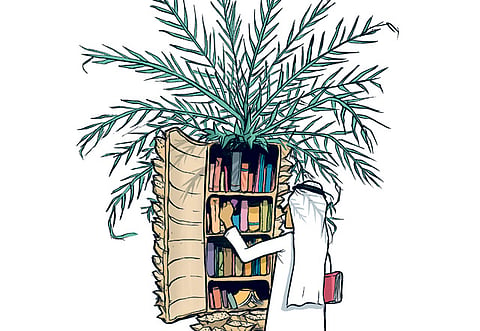Cultural development should be the next step
The customs, institutions and achievements of the Arab people must be the template that shapes the human and architectural components of our cities

When you are in a modern city but cannot find a library; when you find a library but not the book you are looking for; when you find the book but only in a foreign language; when some books are read only by those who wrote them; when there is no legal framework to regulate the relationship between the writer and the publisher; when there is no mechanism for marketing the book or its author; when all these circumstances come together in one place, it means that "culture" is at stake.
Arabic culture is suffering while the publishing industry, with all its components, is flourishing in the West, where it is an essential part of the culture of those societies. In developed countries, business between the writer and the publisher is facilitated by a literary agent. This profession is almost non-existent in the Arab world, where the author has to deal directly with the publisher. This could involve losses for both parties and the victim in all cases is often the Arabic book, which gets lost in this dilemma.
Arabic books and Arab authors are suffering and looking for guardians in our vast Arab nation. Books are not always available at bookshops, some are seen only at book fairs and many don't make it to market because of the censor's list, which grows at a rate higher than the GDP of any Arab country. When some philanthropist wishes to support one of the writers, the utmost he/she can do is probably to arrange a signing ceremony during one of the local book fairs.
When "culture" in its overall meaning is minimised into partial elements such as paintings hung on the walls of exhibition halls and museums — which are also suffering in our region — it means that our cultural awareness is still ranging far from the truth and reality. We appreciate art as a sublime human output, but limiting culture to certain sporadic and ill-planned activities and events does not help the cultural knowledge project of civilised cities. This project, if applied properly, will inevitably help the human development of any society aspiring to join the league of developed and civilised nations.
Dominant
Why is culture a prominent component of international cities? There, culture dominates other disciplines, including commerce and politics, which cannot reduce the remarkable humanitarian glow of culture. In all its definitions, culture remains the template that shapes the human and architectural components of any city. It continues to be the most attractive element for people regardless of their level of civilisation or education.
"Sometimes, confidence should return to cities," say the people of Glasgow, Scotland, the city which has been transformed from an industrial city with some cultural features into a haven for culture and tourism and was selected the European capital of culture in 1990. Cultural development helped the city become a successful and attractive business hub in Europe. The residents of Glasgow restored confidence in their city and its capabilities, even during the recession that hit Britain in the 1990s. Soon the city became a commercial and cultural centre portraying the rich Scottish heritage. Today, Glasgow is one of the top tourist destinations in the UK.
Failure
The biggest challenge facing most Arab cities is that we overlook the role of culture while planning for sustainable development. "Culture was the great forgotten issue among the Millennium Development Goals," deplored Koïchiro Matsuura, Unesco's former director-general. We still suffer from misunderstanding "culture" and confining it to some formalities that end with the event. Developing human potential, the real cultural investment, is forgotten.
Societies in the Gulf countries face an identity issue, hence the need for a deeper understanding of the relationship between culture in its comprehensive definition and identity. Human cultural investment will effectively help us solve identity-related problems.
We bet that culture will bring us together. It is the best solution for communication and civilised understanding among peoples. According to UN studies, culture is one of the main pillars of knowledge, as well as the economic, social and environmental development of any country. Modern cities have a role to play in applying this concept on a larger scale and making culture part of the society and a way of living and not limiting it to certain people or places. We still suffer from cultural discrimination in the Arab World. Culture, like education, should be for all.
The biggest burden in activating the role of culture in society falls on decision makers. In order to establish a real cultural movement, officials should take the issue seriously. Our Arab cities have great cultural heritage, but it's neglected and buried under a merciless material life that moves at a rapid pace and which makes us overlook the beauty of things around us. Social life has been compressed into an exhausting daily routine. Years pass and we wake up to the reflections of the sun's rays on buildings unknown to us.
Jamal Al Shehhi is an Emirati writer.



